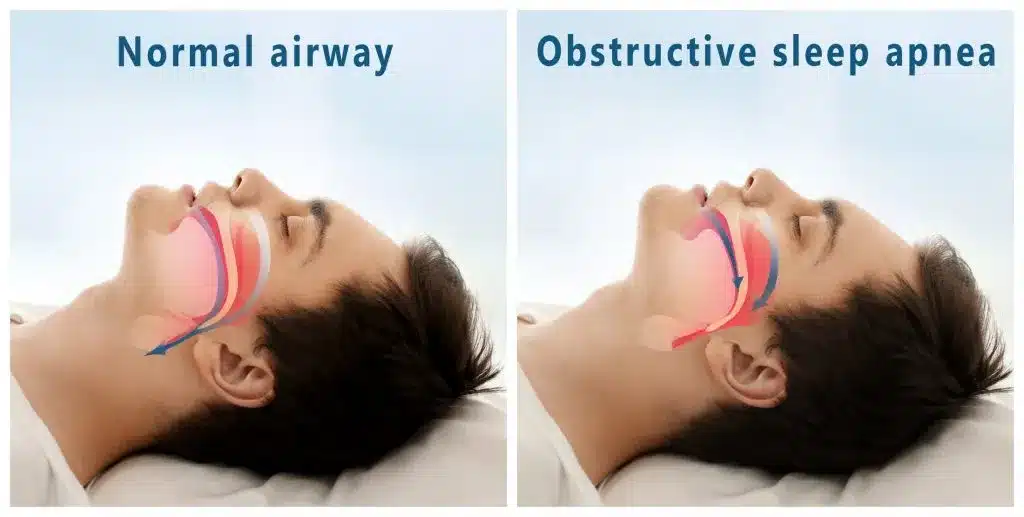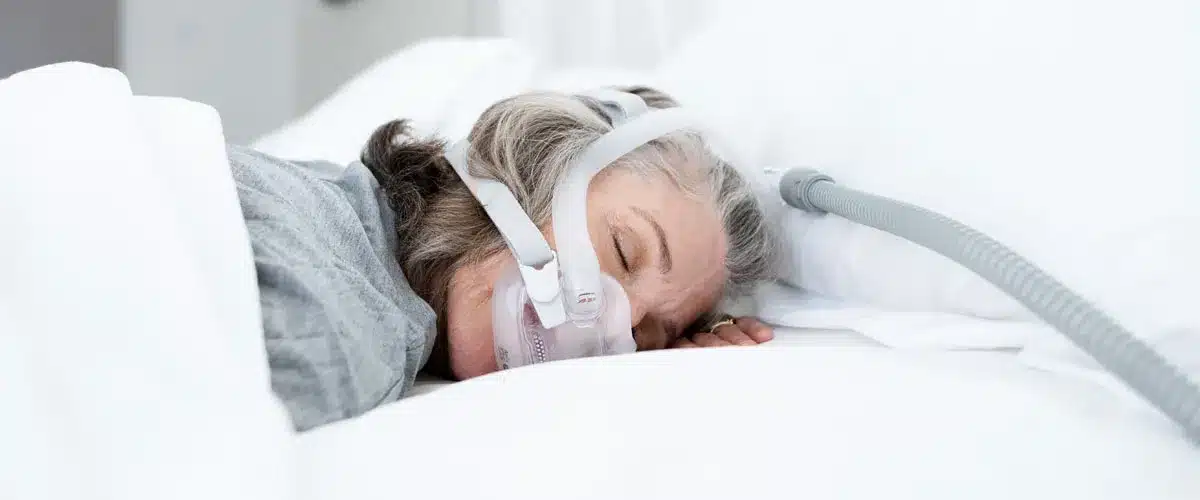Sleep Apnea
Sleep apnea, a relatively common disorder, disrupts breathing during sleep. In obstructive sleep apnea (OSA), the upper airway narrows or becomes blocked, leading to disruptive breathing. It’s akin to trying to breathe through a straw. Individuals with severe OSA may experience upwards of 30 breathing disruptions per night. As we delve deeper into understanding sleep apnea, several crucial links to excess body weight emerge.

Why Excess Weight Causes Sleep Apnea
- Pharyngeal Fat: Excess weight leads to fat deposits in the neck, specifically pharyngeal fat. During sleep, this fat can block the upper airway, especially when the airway is already relaxed. No wonder snoring is one of the most common sleep apnea symptoms! The restricted airway causes noisy breathing.
- Abdominal Girth: Increased abdominal fat compresses the chest wall, reducing lung volume. Diminished lung capacity makes the upper airway more prone to collapse during sleep.
- BMI Matters: The risk of OSA rises with body mass index (BMI), which measures body fat based on height and weight. Even a 10% weight gain is associated with a six-fold increase in OSA risk.
The Vicious Cycle
- Weight Gain and Sleep Apnea: Interestingly, insufficient sleep may lead to weight gain. Sleep deprivation affects hormones—decreased leptin (an appetite suppressant) and increased ghrelin (an appetite stimulant). This hormonal imbalance may lead to cravings for calorie-dense foods, contributing to weight gain.
- Weight Loss Improves Sleep Apnea: Encouragingly, numerous studies show that shedding excess weight can improve sleep apnea. While it may not completely reverse OSA, weight loss reduces breathing pauses during sleep and decreases daytime sleepiness. It can also lower blood pressure and enhance overall quality of life
A study published in the American Journal of Respiratory and Critical Care Medicine examined the effects of weight loss on sleep apnea. Participants who lost an average of 10% of their body weight saw a 30% reduction in the severity of their sleep apnea symptoms. This reduction was attributed to decreased neck circumference and abdominal fat, leading to less airway obstruction.
Moreover, losing weight can enhance the effectiveness of other sleep apnea treatments, such as continuous positive airway pressure (CPAP) therapy. Patients often find that they need lower pressure settings on their CPAP machines after losing weight, making the treatment more comfortable and tolerable.
The Role of Tirzepatide
Sleep apnea, a common sleep disorder characterized by interrupted breathing during sleep, often affects individuals with obesity. The close connection between these two conditions has prompted researchers to explore weight-loss strategies as potential treatments for sleep apnea.
Recent research highlights the promising role of tirzepatide, a dual GLP-1, and GIP receptor agonist, in managing obstructive sleep apnea. In two phase 3 clinical trials, adults with moderate-to-severe sleep apnea and obesity received tirzepatide or a placebo for 52 weeks. The results were remarkable:
- Weight Loss: Participants on tirzepatide experienced an impressive weight loss of approximately 16–17%.
- Apnea–Hypopnea Index (AHI) Reduction: The AHI, a measure of sleep apnea severity, decreased by 48–56% in the tirzepatide group compared to placebo.
- Blood Pressure Improvement: Tirzepatide also led to improved systolic blood pressure, especially among those not receiving continuous positive airway pressure (CPAP) therapy.
The Path Forward and How Preston’s Pharmacy Can Help!
While gastrointestinal side effects were mild to moderate, the overall safety profile of Tirzepatide was acceptable. This research brings us closer to a pharmacological treatment for obstructive sleep apnea. Preston’s Pharmacy offers Tirzepatide and Vitamin B6 in 2mL vials with 10mg / 2.5mg per mL.
The dosing schedule can differ depending on the individual. Preston’s Pharmacy adds Vitamin B6 to tirzepatide injections to negate these side effects. Vitamin B6 can help the body process certain amino acids, which helps reduce these GI symptoms.
For more information or any questions, feel free to reach out to our pharmacists at (703) 522-3412 or email wellness@prestonspharmacy.com. Help us help you!







